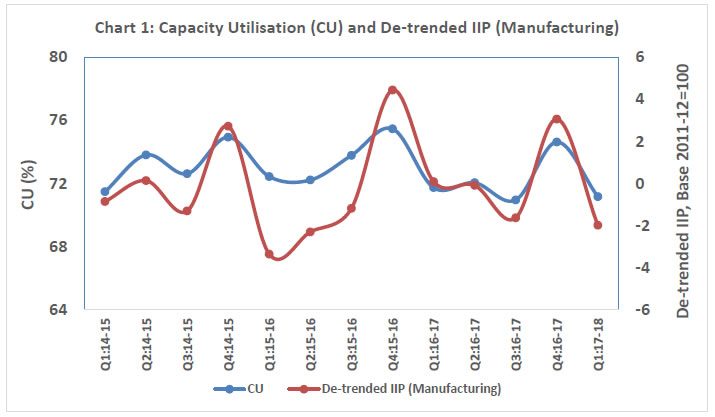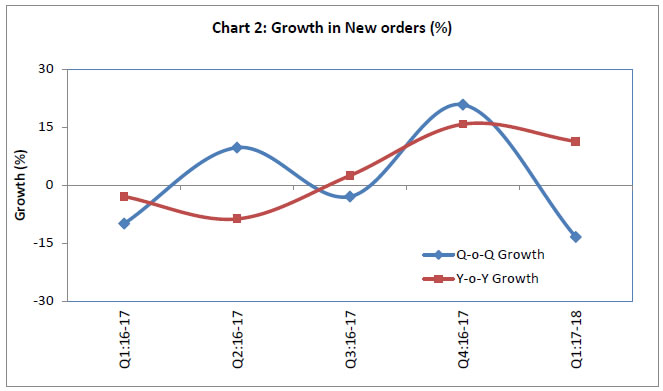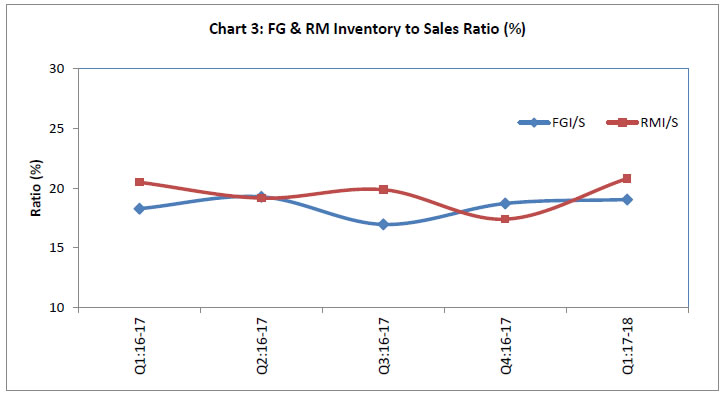 IST,
IST,
OBICUS Survey on the Manufacturing sector - Q1:2017-18
Today, the Reserve Bank released results of the 38th round of the Order Books, Inventories and Capacity Utilisation Survey (OBICUS) for the quarter April-June 2017 covering 805 manufacturing companies. The survey provides a snapshot of demand conditions in the Indian manufacturing sector1. Highlights: 1) Capacity Utilisation (CU)2: At the aggregate level, CU recorded a decline3 and stood at 71.2 per cent in Q1:2017-18, co-moving with the de-trended index of industrial production4 (IIP) for the manufacturing sector (Chart 1). 2) Order Books: New orders recorded a contraction in Q1:2017-18 from the previous quarter, but a substantial improvement was observed over their level a year ago (Chart 2). 3) Finished Goods Inventory to Sales Ratio: The finished goods inventory to sales ratio (FGI/S) rose sequentially in Q1:2017-18 and was also higher on a year-on-year basis. 4) Raw Material Inventory to Sales Ratio: The raw material inventory to sales ratio (RMI/S) rose significantly in Q1:2017-18 from the previous quarter’s level (Chart 3). ANNEX 1: Data Tables
ANNEX 2: Change in the Methodology for the Compilation of Capacity Utilisation (CU) The OBICUS survey captures information from selected companies in the manufacturing sector on installed capacity vis-a-vis actual production (in quantity and value terms) for different products. The methodology for aggregating this information to arrive at an estimate of the capacity utilisation (CU) for the manufacturing sector was published earlier in the December 2011 issue of the Reserve Bank’s Bulletin (link: /documents/87730/39710577/05_ARB091211.pdf). The methodology of compiling the CU has been changed from the current round of the survey based on the recommendations of the Technical Advisory Committee on Surveys (TACS) constituted by the Reserve Bank. Details of the changes adopted are given below:
The time-series on CU since Q1:2013-14, based on new and old methodologies is provided in the Table below for ready reference.
1 The survey responses are those of the respondents. The 37th round of the OBICUS covering 724 manufacturing companies with reference period as January-March 2017 was released on the RBI website on August 02, 2017. 2 The Reserve Bank has revised the methodology for the compilation of capacity utilisation from the current round and summary of the same is provided in Annex 2. 3 However, seasonally adjusted CU remained flat. 4 IIP is calculated on a fixed base (currently 2011-12=100) whereas the denominator (viz. installed capacity) in CU is updated every quarter. For comparison, the trend component of IIP is removed. | |||||||||||||||||||||||||||||||||||||||||||||||||||||||||||||||||||||||||||||||||||||||||||||||||||||||||||||||||||||||||||||||||||||||||||||||||||||||||||||||||||||||||||||||||||||||||||||||||||||||||||||||||||||||||||||||||||||||||||||||||||||||||||
પેજની છેલ્લી અપડેટની તારીખ:




















